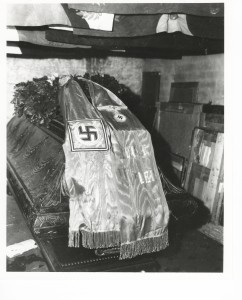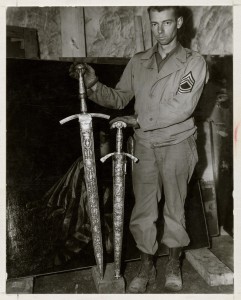
Frederick II “The Great’s” sarcophagus was hidden in a mineshaft by Nazis who feared it would be destroyed by the Allies. It wasn’t (his peripatetic corpse finally was buried on his lawn where he’d originally requested — in the 21st Century).
Frederick II, “the Great,” of Prussia was one of the most brilliant generals that ever lived. His strategy, his tactics, and his relative attention to logistics and mobility were all ahead of their time, and enabled the relatively small principality of Prussia to kick ass and take names all over Europe.
Frederick is also remembered for his correspondence: a witty writer, he was fortunate to live at the time of the Enlightenment, and exchanged pithy and deep letters with Voltaire. He encouraged immigration to Prussia, but particularly skilled immigration: he cared not if one was a Huguenot farmer, Jesuit scholar or a Jewish trader, but if you had something to bring to Prussia the door was open to you. At the same time he accepted Protestants fleeing Catholic pressure in some countries, and Catholics fleeing the Protestants in others — as long as they could bring something to Prussia.
He is less remembered for his artsy personality; he may indeed have been queer as a three-mark coin, and he wrote four symphonies and scores of concertos in the baroque style as well as military marches; he sponsored CPE Bach and received a sonata as a gift from Bach’s father, Johann Sebastian Bach (that’s “the” Bach to you musical ignorami). He preferred French to his native German, but was fluent in both, and functional in several other European languages.

The National Archives calls these swords of Frederick the Great, but says in the same article they were from the coronation of Frederick I, so they may predate the great general-king.
But in military arts, he is remembered for what he said as much as for what he did (which laid the groundwork for Bismarck’s unification of the German states under a Prussian king a century on).
He won battles and lost them; he came within a hair of losing Berlin to a Russian and Austrian alliance that fortuitously fell apart after the death of Elizabeth of Russia and the ascension of her nephew Peter the Great (Peter III, the not-so-great1, see the footnote and correction in comments), an admirer of Frederick, to the throne.
But he was a master of, not exactly the pithy aphorism like those for which Napoleon was deservedly legendary, but a well-turned entire paragraph, of which we have a couple of examples to offer you today.
He had this to say (in a letter to Voltaire, who was critical of Frederick’s militarism), about the military life and its attractions, or lack thereof, for him:
Do you think I take any pleasure in this dog’s life, in seeing and causing death in people unknown to me, in losing friends and acquaintances daily, in seeing my reputation ceaselessly exposed to the caprices of fortune, in spending the whole year with uneasiness and apprehension, in continually risking my life and my fortune? I certainly know the value of tranquility, the charms of society, the pleasures of life, and I like to be happy as much as anybody. Although I desire all these good things, I will not buy them with baseness and infamy. Philosophy teaches us to do our duty, to serve our country faithfully at the expense of our blood and of our repose, to commit our whole being to it.
You may believe him or not — we suspect that he took rather more pleasure in campaigning than that, at least while he was winning. We also suspect Voltaire didn’t buy it for a minute.
The next aphorism is also one that deserves reflection almost 240 years after its utterance. While today’s abstemious (sometimes to the point of asceticism) American officers revel in the purity of the Temple they have made of their bodies, Frederick’s words, from 1777, rise from his grave at Sans Souci to condemn General Order One:
It is disgusting to notice the increase in the quantity of coffee used by my subjects, and the amount of money that goes out of the country as a consequence. Everybody is using coffee; this must be prevented. His Majesty was brought up on beer, and so were both his ancestors and officers. Many battles have been fought and won by soldiers nourished on beer, and the King does not believe that coffee-drinking soldiers can be relied upon to endure hardships in case of another war.
Yeah. What Fred said.
The only reason we haven’t actually lost yet is that the pathetic hadjis are coffee-drinkers, too.
1 Re: Peter the not-too-great, read Max’s comment and check the bios at Biography.com and at Russian state-controlled broadcaster Russia Today for the short and unhappy reign of this guy, who was most important in Russian history as the way that Catherine the Great (who really was great) rose to the throne. The problem with kings and nobles is, of course, the tendency to regression to the mean (or beyond) in their posterity.

Kevin was a former Special Forces weapons man (MOS 18B, before the 18 series, 11B with Skill Qualification Indicator of S). His focus was on weapons: their history, effects and employment. He started WeaponsMan.com in 2011 and operated it until he passed away in 2017. His work is being preserved here at the request of his family.

9 thoughts on “Fred the Great: On Duty, and On General Order Nº1”
WM provides comic relief: “the only reason we haven’t lost…”. If current events in Afghanistan and Syria/Iraq are a victory, give me defeat ASAP. And don’t bother blaming Zero. The seeds for this debacle were planted long ago: 1948, when the Zionist demi-state appeared on the map of the Middle East; and 1971, when Nick Dixon stopped backing the dollar with gold and started backing it with lead
Strongly disagree, if I may so.
A highly neurotical individual favoured by luck and circumstances,
a dwarf on the the shoulders of daddy and gramps.
Pushed to fame by Prussian mil analysts, even the Clausewitz school of thinking is guilty.
The ‘Oblique Order’ and the subsequent victory at Hohenfriedberg developed by chance, not by planning and only succeeded at Leuthen by a narrow margin.
http://en.wikipedia.org/wiki/Oblique_order
http://bevinalexander.com/excerpts/early-wars/frederick-great-oblique-order-attack.htm
http://www.larouchepub.com/other/2011/3808frederick_defeat_superior_enemy.html
Guys like Eugen von Savoyen and the Türkenlouis showed real awesomeness when badassing the Ottoman Empire.
Nah. It’s because they’re a bunch of inbred clans who can’t trust each other.
That and/or* and they’ve been breeding with the vast number of slaves they kidnapped from Africa. In any case, they’re unreliable and generally crap. That’s what people I know who worked with them say.
The heat doesn’t help either, I think. Anyway, Finns have been consuming world-record amounts of coffee per capita and they did pretty fine in in the Winter and Continuation war.
*I’m not entirely convinced that the theory that people who in countries with high levels of cousin marriage are less likely to trust strangers than those who come from countries where cousin marriage is uncommon or even illegal.
Someone ought to send a memo to Pentagon that moderate alcohol use improves memory. Causality of that has been established pretty well in rats at least.
Re: Coffee Prohibition
http://en.wikipedia.org/wiki/Coffee#Prohibition
Re: European Coffee Culture
Vienna, Sept 12th 1683.
500 sacks of coffee left behind when Johan Sobietzki kicked Kara Mustafa Pascha in the groin.
http://de.wikipedia.org/wiki/Zweite_Wiener_Türkenbelagerung
http://en.wikipedia.org/wiki/Coffee#Historical_transmission
To celebrate the victory the Viennese patissiers created the croissant pastry, which is therefore hated by some followers of the peace
http://newsfeed.time.com/2013/08/02/syrian-rebels-ban-croissants-in-aleppo/
Enjoy your cuppa, and have a croissant with it.
Indeed, Oberndorfer, it was clever of the Viennese to eat the moon, but I suspect that this is a forgotten fact by our local moon god worshipers. Croissants are served daily in our university cafeteria, and though we have quite a contingent of Saudis here on their government dime to ‘pick up foreign knowledge and culture’ for to benefit the Kingdom, said Saudi students have yet to raise a peep about it. I doubt they even know.
Actually some of the Yemeni Arabs (which we used to call Yo! Men) I studied with were quite fond of booze, especially in form of cocktails, although I admit that they didnt particularly like beer. They also smoked like locomotives, all spare time with cigarettes in mouth. One of these partying fellows got deported on some murky security issues with local counterspooks – that one was, coincidentally, also the most religious of them. One married locally and is living here to this very day, and the rest of them gone back to Yemen, where they have to hide their liquor stashes and pass their days on coffee.
A bit of historical correction: when you’re speaking about the 7-years war in Europe and demise of the empress Elizabeth, you note that “after the death of Elizabeth of Russia and the ascension of her nephew Peter the Great”
In fact, the Peter the Great, aka Peter the 1st, was the father of Elizabeth; it was Peter the 3rd (who was quite far from being “the Great” by all accounts) who ascended to the Russian throne in 1761
Thanks for the correction, Max. I’ll make a correction in the story. At least I’m right about some Tsar Peter’s ascension saving Fred from having his Prussian ass kicked.
ahhhh General Order #1, violated so frequently and so creatively. But always in moderation.